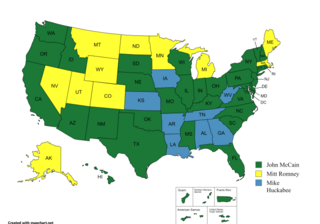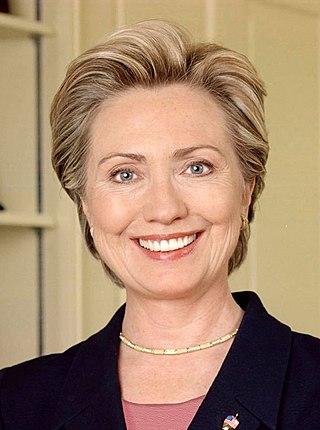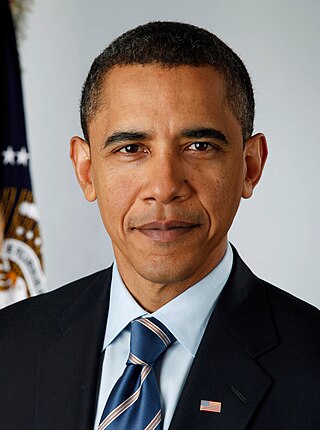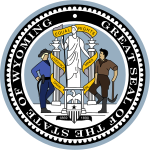
The 2008 Iowa Democratic presidential caucus occurred on January 3, and was the state caucuses of the Iowa Democratic Party. It was the first election for the Democrats of the 2008 presidential election. Also referred to as "the First in the Nation Caucus," it was the first election of the primary season on both the Democratic and Republican sides. Of the eight major Democratic presidential candidates, then-U.S. Senator Barack Obama of Illinois received the most votes and was ultimately declared the winner of the Iowa Democratic Caucus of 2008, making him the first African American to win the caucus and the first African American to win a primary state since Jesse Jackson in 1988. Former U.S. Senator John Edwards of North Carolina came in second place and then-U.S. Senator Hillary Clinton of New York finished third, though Clinton received more delegates than Edwards. Campaigning had begun as early as two years before the event.

This article contains the results of the 2008 Republican presidential primaries and caucuses.

The 2008 Nevada Democratic presidential caucuses took place on January 19, 2008 after having been moved from a later date by the Nevada Democratic Party. The Nevada Democratic Caucus was considered important in determining the eventual party nominee, as many described it as the "Bellwether of the West" seeing as how it is the first Western state to vote in the Democratic Presidential Primary season.

The 2008 Colorado Democratic presidential caucuses took place on Super Tuesday, February 5, 2008. As he did in every other state that held a caucus rather than a primary, Barack Obama won the caucus by a wide, two-to-one margin over Hillary Clinton.

The 2008 North Dakota Democratic presidential caucuses took place on February 5, 2008, one of the many Super Tuesday nominating contests held that day. Barack Obama won the caucuses, securing 8 out of 13 national delegates.

The 2008 Washington Democratic presidential caucuses were a series of events held by the Washington State Democratic Party to determine the delegates that the Party sent to the 2008 Democratic National Convention. Delegates were selected in a four-tier process that began with precinct caucuses, was further refined in legislative district caucuses and/or county conventions, concluded for some delegates in the congressional district caucuses, and finally concluded for the remaining delegates at the state convention.

The 2008 Nebraska Democratic presidential caucuses took place on February 9, 2008, where 24 of the state's 31 convention delegates were chosen. Like he did throughout many other states that held caucuses instead of primaries, Barack Obama won the Nebraska Democratic Caucus by more than a two-to-one margin of victory over Hillary Clinton. On May 13, 2008, the state also held a non-binding primary election which Obama also won but the margin of victory was considerably smaller.

The 2008 Maine Democratic presidential caucuses took place on February 10, 2008, and had 24 delegates at stake. The winner in each of Maine's two congressional districts received all of that district's total delegates, which totaled 16. Another eight delegates were awarded to the statewide winner, Barack Obama, at the Maine Democratic Party Statewide Convention on May 31, 2008. These 24 delegates represented Maine at the Democratic National Convention in Denver, Colorado. Another 10 unpledged delegates, known as superdelegates, also attended the convention and cast their votes as well.

The 2008 Vermont Democratic presidential primary was an open primary that took place on March 4, 2008. Barack Obama won the primary, his only decisive win among the four March 4 contests. The primary determined the 15 pledged delegates that represented Vermont at the 2008 Democratic National Convention. The delegates were awarded to the candidates, Obama and Hillary Clinton, on a proportional basis. Vermont also sent 8 unpledged "superdelegates", to the convention not bound by the results of the primary.

The 2008 Texas Democratic presidential primary and caucuses were a series of events to determine the delegates that the Texas Democratic Party sent to the 2008 Democratic National Convention. Delegates were selected using results from two sources: the Texas Presidential Primary held on March 4 by the Secretary of State of Texas's office, and a series of caucus events held between March 4 and June 7 by the Texas Democratic Party. The indecisive results of Super Tuesday, and the fact that Texas had the largest number of delegates among the states remaining on the Democratic primary calendar, resulted in the Texas primary receiving significant attention from both the Hillary Clinton and Barack Obama campaigns.

The 2008 United States presidential election in Washington took place on November 4, 2008, and was part of the 2008 United States presidential election. Voters chose 11 representatives, or electors to the Electoral College, who voted for president and vice president.

Voters of the Republican Party elected state delegations to the 2012 Republican National Convention in presidential primaries. The national convention then selected its nominee to run for President of the United States in the 2012 presidential election. There were 2,286 delegates chosen, and a candidate needed to accumulate 1,144 delegate votes at the convention to win the nomination. The caucuses allocated delegates to the respective state delegations to the national convention, but the actual election of the delegates were, many times, at a later date. Delegates were elected in different ways that vary from state to state. They could be elected at local conventions, selected from slates submitted by the candidates, selected at committee meetings, or elected directly at the caucuses and primaries.

The 2020 Idaho Democratic presidential primary took place on March 10, 2020, as one of several states voting the week after Super Tuesday in the Democratic Party primaries for the 2020 presidential election. The Idaho primary required that voters would be registered Democrats or unaffiliated, and awarded 25 delegates towards the 2020 Democratic National Convention, of whom 20 were pledged delegates allocated on the basis of the primary results.

The 2020 Alaska Democratic presidential primary had been scheduled to take place on April 4, 2020, in the Democratic Party primaries for the 2020 presidential election, but in-person voting was cancelled due to the COVID-19 pandemic and mail-in voting was extended to April 10, 2020. The Alaska primary was a closed party-run primary, with the state awarding 19 delegates to the 2020 Democratic National Convention, of which 15 were pledged delegates allocated on the basis of the results of the primary. Voters cast ranked-choice voting ballots, with a voter's ballot counting for four ranked backup choices if their original choice was in last place and below the 15 percent threshold for winning delegates.

The 2020 Hawaii Democratic presidential primary had been scheduled to take place on April 4, 2020, a Saturday, in the Democratic Party primaries for the 2020 presidential election, but in-person voting was cancelled due to the COVID-19 pandemic and mail-in voting was extended to May 22, 2020. Instead, voters had until May 22 to submit mail-in ballots. The Hawaii primary was a closed party-run primary, awarding 33 delegates to the 2020 Democratic National Convention, of which 24 were pledged delegates allocated on the basis of the results of the primary. Voters cast ranked-choice voting ballots, with a voter's ballot counting for two ranked backup choices if their original choice was in last place and below the 15 percent threshold for winning delegates.

The 2020 Rhode Island Democratic presidential primary took place on June 2, 2020, after being postponed due to concerns about the coronavirus pandemic, as one of eight delayed and regular primaries on the same day in the Democratic Party primaries for the 2020 presidential election. It was originally planned to take place on April 28, 2020, as one of several northeastern states in the "Acela primary". The Rhode Island primary was a semi-closed primary, with the state awarding 35 delegates, of whom 26 were pledged delegates allocated on the basis of the primary results.

The 2020 Nebraska Democratic presidential primary took place on May 12, 2020, as part of the Democratic Party primaries for the 2020 presidential election. The Nebraska primary was a semi-closed primary and awarded 33 delegates to the 2020 Democratic National Convention, of which 29 were pledged delegates allocated on the basis of the results of the primary, and was the only contest on that date.

The 2020 Wyoming Democratic presidential caucuses had been scheduled to take place on April 4, 2020 in the Democratic Party primaries and caucuses for the 2020 presidential election, but in-person voting was cancelled due to the COVID-19 pandemic and mail-in voting was extended to April 17, 2020. The Wyoming caucuses were a closed caucus, with the state awarding 18 delegates to the 2020 Democratic National Convention, of which 14 were pledged delegates allocated on the basis of the results of the caucus. Voters cast ranked-choice voting ballots, with a voter's ballot counting for four ranked backup choices if their original choice was in last place and below the 15 percent threshold for winning delegates.

Although Guam did not participate in the 2020 presidential election because it is a U.S. territory and not a state, it still participated in the U.S. presidential primaries and caucuses. Former vice president Joe Biden won the Democratic caucus, held on June 6. The Republican caucus, held on March 14 in the form of a "state convention", endorsed incumbent President Donald Trump.

The 2000 Wyoming Democratic presidential caucuses took place on March 25, 2000, the only contest scheduled that day. The Wyoming caucuses were a closed caucus, with the state awarding 18 delegates to the 2000 Democratic National Convention, of which 13 were pledged delegates allocated on the basis of the results of the caucus.


















